2011 Program

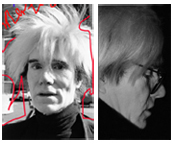
Kinofest NYC marks its opening night with the opening of the photo exhibit Slavs of New York:
Andy Warhol's Nowhere at The Millennium Gallery. Curated by New York artist Cynthia von Buhler, the exhibit features photographs of Andy
Warhol, a selection coming from her acclaimed 2007 exhibit Andy Warhol: In His Wake,
which featured works by Warhol's superstars and friends: Ultra Violet, Billy Name, Ivy Nicholson,
Taylor Mead, Anton Perich and William John Kennedy. The body of Warhol photographs at this exhibit
include the work of Anton Perich and Sebastian Piras, with additional photographs of celebrated
Ukrainians by photographer Kyle Cassidy. Cynthia von Buhler's The Great Warhola, an interactive
fortune-telling machine created for her 2007 exhibit, will also be on display.
This Opening Night Reception is free and open to the public.
Slavs of New York: Andy Warhol's Nowhere runs March 16 - March 30 at the Millennium Gallery.
links: Cynthia von Buhler, Anton Perich, Sebastian Piras

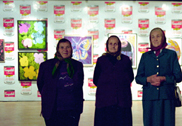
When asked about his origin, Andy Warhol used to say “I am from nowhere.” Nowhere is actually the tiny village Mikova in Slovakia where all of Warhol’s ancestors lived. Georg Misch’s quirky, entertaining and informative documentary investigates the fuss media has made of Warhol’s relatives who still live there, Warhold-related media fame, and Warhol’s legendary '15 minutes of fame.'
Director: Georg Misch, 79 min, language: Slovak/English (w/Eng. subtitles), 2002, website

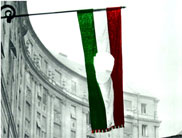
This incisive sociopolitical and historical documentary by Klaudia Kovacs covers the 1956 Hungarian Revolution and the ensuing international decline of communism with both archival footage and interviews with then youthful revolutionaries, Russia’s Budapest-based troop commander and other historical notables. The extensive interviews span across the US, Hungary, Russia and Italy supplying viewers with lots of new information on behind-the-scenes political dramas leading up to and shortly after the revolution. This film garnered 8 film festival awards worldwide and participated in the 2009 Oscar competition in the “Best Documentary” category.
Director: Klaudia Kovacs, 96 min, Hungarian/English (w/Eng. subtitles), USA, 2007
--- Preceded by the film short:

The First Karaoke starts with joyous Soviet Ukrainians singing the praises of communist life and ends with a surprise kicker.
Director: Oleh Chorniy, Gena Khmaruk, 2 min, Ukrainian (w/ Eng.subtitles), Ukraine, 2005

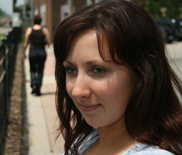
Kat Rohrer’s searing and eye-opening documentary about human trafficking exposes the modern day version of sex slavery and the lesser known crime of manual labor slavery. The film focuses on post-Soviet human trafficking in particular out of Ukraine’s Black Sea port city, Odesa. Heart-breaking interviews with trafficked victims are interspersed with commentary from feminist activist Gloria Steinam and acclaimed British actress Emma Thompson who’s been advocating at the U.N. for stricter legislation to prosecute traffickers.
Director: Kat Rohrer, 60 min, Russian/English (w/Eng. subtitles), USA, 2009, website
Director Kat Rohrer will introduce her film and lead the Q&A
--- Preceded by the film shorts:

A disturbing documentary about Liza, a homeless, independent 11-year-old orphan in Kyiv who’s learned to manipulate the system in order to survive. Poignant and touching.
Director: Taras Tomenko, 21 min, Russian (w/Eng. subtitles), Ukraine, 2006

Set in Holland, three undocumented workers: a Chechen biology teacher, a former Russian boxer, and Bingo, a Moldavian gypsy, illegally earn money performing demolition. They soon learn that not only the work can be extremely dangerous but that when things go wrong, their very lives are considered expendable.
Director: Timur Ismailov, 28 min, Russian (w/Eng. subtitles), Netherlands, 2009

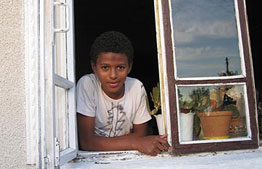
This film tells about the unusual choice of a Ukrainian woman named Natalia. Having two higher university degrees, she found her life mission in adopting and taking care of sickly abandoned children of different nationalities. Through the eyes and heart of Natalia's 12 year old son Kevin, we are able to feel the warmth, love, gladness, difficulties and special atmosphere which dominates in this unusual family. Original Еthno-Сhaos "DakhaBrakha" Band's music and pictures of the well known Ukrainian artist Evgeniya Gapchinska increase the impression of the story.
Director: Olena Fetisova, 52 min, Ukrainian (w/Eng. subtitles), Ukraine, 2009, website
--- Preceded by the film short:

One of Carpathian Ukraine’s dying breed of herbal magicians and medicine men talks about casting spells, the contents of magic potions, and his ability to predict the future and influence weather.
Director: Slava Feofilaktov, 35 min, Ukrainian, (w/ Eng. subtitles), Ukraine, 2008


A deaf, mute young man is questioned by a hulking policeman and his partner in their squad car. The short film highlights authority’s arbitrary thuggishness in present day Ukraine. This short received a
Golden Bear nomination in 2010 at the Berlin Film Festival for Best Short Film
and was a finalist at the 2010 Martha's Vineyard International Film Festival.
Director: Myroslav Slaboshpytskiy, 11 min, Ukrainian (w/Eng.subtitles), Ukraine, 2010

Rampant drug addiction, AIDS and relationships among homeless Ukrainian youth who form their own community in abandoned buildings to survive.
This short received a Golden Bear nomination in 2009 at the Berlin Film Festival for Best Short Film.
Director: Myroslav Slaboshpytskiy, 15 min, Ukrainian (w/Eng.subtitles), Ukraine, 2009

A man moves to the bucolic Ukrainian countryside to elude the madness of city life. But he’ll soon find he can’t escape the omni-present brutality of humankind.
Director: Myroslav Slaboshpytskiy, 20 min, Ukrainian (w/Eng.subtitles), Ukraine, 2006

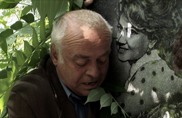
A gentle, textured exposé narrated by the filmmaker Maksym Vasyanovych about his own childhood but focusing on his father, an elderly provincial classical conductor in Zhytomyr who gave up the chance to study for a professional career as a big-time symphony director in order to raise his family. The director beautifully captures his father’s daily activity and commentary liberally sprinkled with regret for what could have been. Touching and insightfully honest.
Winner of Best Film of Ukrainian Panorama and Special Prize
for Best Ukrainian Directing Work at the 2009 Molodist Film Festival in Kyiv and top prize in creative
competition at 2010 Docudays UA Film Festival, also in Kyiv.
Director: Maksym Vasyanovych, 52 min, Ukrainian/Russian (w/Eng. subtitles), Ukraine, 2009
Director Maksym Vasyanovych will introduce his film and lead the Q&A

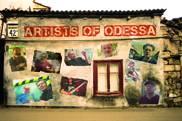
Artists of Odessa is a raw, humorous and nostalgic look at life and contemporary art in post-Soviet Odesa. A dynamic city with its own unique cultural tradition, Odesa was home and muse to Babel, Zhabotinskiy, Eisenshtein, Kandinsky and many others. Walking through the courtyards of Moldavanka, market stalls of famous Privoz, and underground bars of the old quarters the search is on for the inextinguishable creative spirit of The City by the Black Sea.
Director: Dmitriy Khavin, Lilya Klimova, 47 min, English/Russian (w/Eng. subtitles), USA, 2010, trailer
Director Dmitriy Khavin will introduce his film and lead the Q&A
--- Preceded by the film short:

This short film shows Kyiv’s beloved and free-spirited, bohemian, colorfully-becostumed artist (recently deceased) as he creates amazing art from ordinary, everyday items.
Director: Slava Feofilaktov, 13 min, Ukrainian/Russian (w/Eng.subtitles), Ukraine, 2010

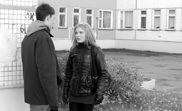
In this youth drama set in an anonymous Byelorussian industrial suburb, two alienated and lonely teens, Olga and Sergei fall in love then fantasize escaping their dead-end, full of teen alcoholism and meaningless violence surroundings. The two young lovers soon have to face the stark fact that their options are limited.
Director: Vladimir Kozlov, 60 min, Russian (w/Eng. subtitles), Belarus, 2010
--- Preceded by the film shorts:

Dreamlike short narrative shows schoolchildren on the verge of puberty playact, foreshadowing budding sexuality. Eroticism mixed with innocent, playful fantasy.
Director: Maksym Bunitsky, 9 min, Ukrainian (w/Eng.subtitles), Ukraine

This visually stunning documentary depicts the daily hardscrabble existence of a group of coal miners and their supportive wives in one eastern Ukrainian mine. Several claustrophobia-inducing shots reveal to viewers the narrow shafts 300 feet below ground then pulls us up to sunlight via a rickety, antiquated pulley system.
Director: Murat Mamedov, 22 min, Russian (w/Eng.subtitles), Ukraine, 2006

An experimental multi-media online project using text and stills which tells a personal story set within the city of Minsk, Belarus over 4 seasons. Screening the first season, Autumn.
Director: Ilya Andreyev, 8 min, English text, Belarus, 2008


The day-to-day lives of women who’ve left their families for months and years in Georgia to earn money as home attendants and nannies in the U.S. The women in this documentary share a packed, rental house in Brooklyn’s Brighton Beach and discuss homesickness, missing weddings, funerals and other family events, and their unemployed spouses' over-dependence on the women’s earnings, etc.
Director: Levan Koguashvili, 53 min, Georgian/English (w/Eng. subtitles), Georgia
--- Preceded by the film short:

A documentary about a town in Polissia that once had Europe's longest narrow-gauge railway, now lost and derelict in the marshes. How do people survive after the collapse of the regional economy when there is no work or money?
Director: Olesandra Khrebtova, Olesandr Balaban, 35 min, Ukrainian (w/Eng.subtitles), Ukraine, 2009


Pavia Fleischer’s documentary chronicles a road trip through Ukraine by the filmmaker and Eugene Hutz, frontman and lead singer of New York's gypsy punk band Gogol Bordello. Hutz's purpose is to rediscover his Romani gypsy roots and learn the secrets of gypsy music. Fleischer’s's aim is to rediscover a forgotten romance. The result is a story of two people traveling together on two very different yet convergent courses.
Director: Pavla Fleischer, 65 min, Ukrainian/Russian/English (w/Eng. subtitles), 2006, website, trailer
--- Preceded by the film shorts:

Olja, an urbane teen who’s been living abroad for eight years, revisits her hometown Akbulak, a small, dusty speck in Kazakhstan. It’s a stirring film about reconnecting with one’s roots, rediscovering the haunts of one’s childhood and resurrecting old friendships.
Director: Tatjana Korol, 15 min, Russian (w/Eng.subtitles), Kazakhstan/UK, 2008

An off-beat dark comedy about misguided dreams of entrepreneurship and the coming of age of a post-Soviet Russian teenage boy. His attempt at playing ‘pimp’ by prostituting two young women soon go awry.
Director: Julia Kots, 13 min, Russian (w/Eng.subtitles), USA, 2007

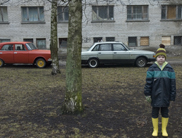
Jaak Kilmi’s film is a tongue-in-cheek documentary about growing up in the Estonian capital of Tallinn during the waning days of the Cold War. The filmmaker comically recounts how Estonians discovered the American series Dallas via television transmissions from Helsinki, Finland, and how the Communist leadership haplessly attempted to 'protect' their citizens from the corrupting influence of televised capitalist decadence. A lot of wonderful chest-pounding Soviet government footage mixed with ones of ordinary Estonians jerry-rigging their tv antennas.
Director: Jaak Kilmi, 80 min, Estonian (w/Eng. subtitles), Estonia, 2010, trailer
, (photo courtesy Icarus Films)
--- Preceded by the film shorts:

After the fall of the Soviet Union many families were separated by the borders of
new states. Kljusy is a unique village that rests smack on the borders of Ukraine, Byelorussia and Russia. The village is full of earthy, interesting, comical characters, many who’ve intermarried. Often relatives have to meet illegally. This is what happens on Radunytsa (All Saint's Day) when family members who live in three different countries meet at cemeteries.
Director: Roman Bondarchuk, 15 min, Ukrainian, Russian, Surzhyk (w/ Eng.subtitles), Ukraine

The First Karaoke starts with joyous Soviet Ukrainians singing the praises of communist life and ends with a surprise kicker.
Director: Oleh Chorniy, Gena Khmaruk, 2 min, Ukrainian (w/ Eng.subtitles), Ukraine, 2005


A selection of short films and animations from Ukrainian filmmakers.
Answer for a Prayer
Director: Maksym Bunitsky, Ukrainian (no subtitles), Ukraine, 2009, 3 min
Long Walk Forever
Director: Maksym Bunitsky, Ukrainian (w/Eng. subtitles), Ukraine, 2010, 17 min
Believe
Director: Christina Danylov, no dialogue, Ukraine, 2010, 4 min
No comments
Director: Dar Dryuchenko, no dialogue, Ukraine, 2010, 3 min
Melancholy Colors
Director: Stanislav Leschenko, no dialogue, Ukraine, 2009, 7 min
Ama at Sea
Director: Malia Cohen, Ukrainian (w/ Eng.subtitles), USA, 2009, 20 min
Not Scared
Director: Kateryna Naumenko, Ukrainian (w/ Eng.subtitles), Ukraine, 2009, 13 min
Switchman
Director: Serhiy Siliava, no dialogue, Ukraine, 2009, 10 min
Vedmedya Posluha
Director: Zhenya Alyokin, Ukrainian (w/ Eng.subtitles), Ukraine, 2003. Animation, 10 min
Wandering Between
Director: Anatoliy Lavrenishin Ukrainian (w/ Eng.subtitles), Ukraine, 2005, Animation, 10 min
Very Close
Director: Mykyta Shulyahyn, Ukrainian (w/ Eng.subtitles), Ukraine, 2010, 17 min


This stunning work remains a perfect distillation of the sense of urban existence.
Composed of footage from Kyiv, Moscow and Odesa, the film shows everyday people at work and
at play, from dawn to dusk, interacting with the machinery of modern life. In the style of other 'city symphony' films of the 1920's,
events are arranged to simulate the passage of a single day through a deliberate sequencing of events. Produced by Dziga
Vertov at Kyiv Film Studios (VUFKU) in 1929, the film serves as a reminder that he is one of
the greatest pioneer filmmakers.
Dr. Yuri Shevchuk, founder of the Ukrainian Film Club of Columbia University, will introduce the film and lead the Q&A, followed by guest speaker Serhiy Trymbach, head of the National Filmmakers Union of Ukraine, who will speak onthe latest developments in Ukrainian filmmaking.
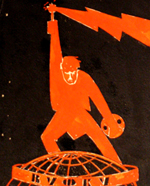
In 1927 Dziga Vertov severed ties with Moscow-based studios and moved to Ukraine to join VUFKU (All-Ukrainian Photo and Film Administration) where he completed his masterpiece Man With the Movie Camera (Liudyna z kinoaparatom, 1929) and several other projects. Industrial conditions receive little attention in the history of 1920s Soviet cinema, and Vertov’s decision to move to Ukraine is never seen in the context of the studio system. Why would a prominent director, entrusted with filming Lenin’s funeral in 1924, go to a “provincial” film studio two years later to continue his career?
In his article “Panfuturists and the Ukrainian Film Culture of the 1920s” Dr. Bohdan Y Nebesio of Brock University explains why.